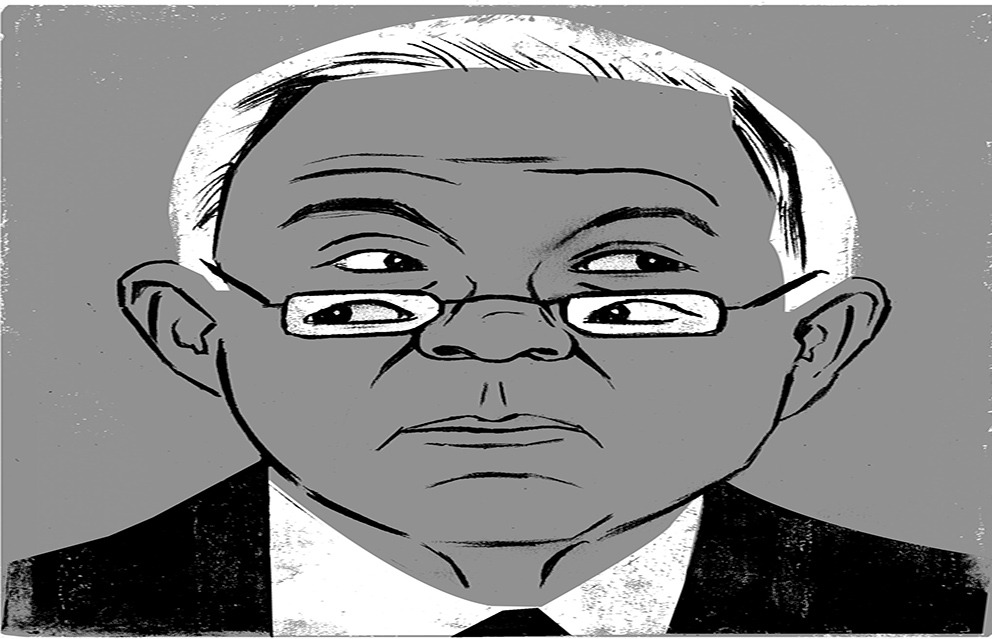Jefferson Beauregard Sessions III was an ambitious young man on the make in 1972. In August, he became one of 3,500 young Republicans who paid their own way to the national convention in order to be dispatched via 70 on-call buses to various locations in Miami to cheer on cue for Richard Nixon and company. In December, as one of Alabama’s members of the electoral college, he cast a vote for Nixon’s reelection. Then, a month before his June 1973 graduation from the University of Alabama Law School, at a conference in Tuscaloosa, Sessions won the race to chair the state branch of the Young Republicans.
By then, in Washington, the Senate Select Committee on Presidential Campaign Action Activities—the “Watergate Committee”—was about to begin hearings that would be televised live on all three networks. In Tuscaloosa, however, the Republican committeewoman from Selma, Jean Sullivan, intrepidly pronounced that a blessing: Watergate “didn’t have anything to do with the national party”; the investigation would serve to root out the bad guys, and would erase any lingering hubris left over from Nixon’s landslide reelection. Then the conference’s featured speaker, a U.S. congressman from neighboring Mississippi, Thad Cochran, hymned the prospect of a new GOP no longer “hamstrung by prejudices,” which promised to make the upcoming years “a most exciting time” to be a Republican in Dixie.
Cochran was only half right. The next seven years were an exciting time to be a Republican in Dixie. But the reason the party flourished was its prejudice. The 1965 Voting Rights Act had changed the political terrain: to survive in the South, the Democratic Party opened itself up to African-Americans. But fortunately for the old segregationists, they had a ready home: the Republicans, whose Mississippi wing passed a platform in 1964 that declared “segregation of the races is absolutely essential to harmonious racial relations and the continued progress of both races in the State of Mississippi.”
In 1973, on the same day the Montgomery Advertiser reported the Young Republicans meeting that coronated Jeff Sessions on page 2, it informed readers on page 1 of the inauguration of the local chapter of an organization devoted to empowering the South’s new class of African-American elected officials. One of the speakers was Mayor Charles Evers of Fayette, Mississippi, whose brother Medgar had been assassinated by the Ku Klux Klan a decade earlier. “I went to jail 26 times,” Charles Evers said when blacks finally had the vote his brother had fought and died for. “But now I’ve got the keys.”
But the prison house of segregationist politics would not fall so easily.
In the years the future U.S. attorney general was coming up as a young lawyer, a disturbing pattern was becoming apparent in the states of the Old Confederacy: the more blacks who voted for Democrats in a district, the more whites countered by voting Republican—often more than making up for the new black votes.
In states like Alabama and Mississippi, the party once reviled as the political wing of General Ulysses S. Grant’s invading hordes was now peopled by young men named after Confederate presidents—such as Jefferson Sessions, appointed as assistant attorney general for Alabama’s Southern District by President Gerald Ford in 1975.
The election of a Southern Democrat as president in 1977 was a setback but a temporary one. By 1978, Thad Cochran became the first Republican senator from the South since Reconstruction, in one of dozens of GOP electoral breakthroughs that year—such as the election to Congress from Georgia of Newt Gingrich, aided by a campaign mailer that featured a photograph of his white, female opponent with a black man.
Then, in 1980, Ronald Reagan, at the advice of Mississippi Republican officials who explained it was the best way to reach the “Wallace-inclined voter,” famously began his general election campaign promising fealty to “states’ rights” at the Neshoba County Fair, just a hop, skip, and a jump from where civil rights workers James Chaney, Mickey Schwerner, and Andrew Goodman had been assassinated in 1964.
There Goes My Everything is Jason Sokol’s aptly titled history of the white South’s response to racial integration. The white South would not let their everything go without a fight.
White Republicans stepped in to inhabit the voids in the power structure left behind by the breaking up of the Democrats’ solid South. A new political order was aborning; and a new political order demanded ambitious young men on the make. The remaining fortification of the former white power structure—the old white men who’d run things since time immemorial—had to be bulldozed aside to make room for the new white men.
The Rise of the Republican Avenger
Enter Jefferson Beauregard Sessions III. Elevated by Reagan in 1982 to U.S. attorney, he began working full-out, not merely to prosecute crime but to turn Thad Cochran’s prediction of boom times for Southern Republicans into prophecy. His vector was a series of politically motivated prosecutions against tribunes of the old Democratic order.
The first targeted a Democratic state senator named Robert Gulledge, who, in 1978, was approached by a neighbor named Otto Schoen who wanted to buy 320 acres of his land. Gulledge agreed to sell and recommended Otto borrow the money from the Federal Land Bank, one of 12 such institutions set up by the federal government to loan money to farmers seeking to expand. The bank loaned Otto Schoen the money, but he couldn’t afford the interest payments and the bank foreclosed. In 1982, Sessions indicted the banker, the senator, and the bank’s attorney, claiming they had “lured” the borrower into the deal in order to kick back their profit to the state senator—even though the alleged victim had been the one who proposed to buy the land in the first place. The senator’s three-week trial came nearly five years after the supposedly cunning ruse began. It involved over 50 witnesses and some 177 exhibits.
The defense lawyer put Jeff Sessions on trial: “The prosecutor is like a dog with a bone. It’s a bone with no meat on it, but he keeps gnawing on it, playing with it, burying it. There just ain’t any meat on it.”
The judge, the Associated Press reported, “reminded the jury of the expense of the four-week trial and ordered jurors to try to reach a verdict Friday afternoon. After several hours the jury said it’s futile to continue talking.” Sessions told the AP he was “too tired” to think about a retrial.
Then, apparently refreshed, he refiled the charges less than a month later—and after 20 more months, he finally gave up, asking the judge to dismiss the case. By that point, the alleged victim had filed a civil suit against Gulledge. Buried among the 5,000 pages of court records concerning the case was the following remarkable sentence: “The Schoens testified that they had no reason to believe that they had been victims of a fraudulent scheme involving the 320 acres until they saw newspaper accounts of the criminal indictment of Gulledge, Payne, and Taylor.”
Sessions, plainly, harbored no such doubts—or at least none regarding his potential to claim a Democratic scalp, in which intention he handsomely succeeded. “It is the end of two horrible years of my life,” Gulledge said when the charges against him were finally dismissed. “I am starting over and hope to be a useful citizen and apply my talents to the benefit of myself and the area.”
Such was the saga of Jeff Sessions, Republican avenger.
Again and again, in case after case, targets were predictable, the methods the same. The former Mississippi state coordinator for Vietnam Veterans Against the War, who took leave from his job as a sociology professor in order to open a counseling center for disturbed veterans in Mobile, was arrested the day the center was set to open, on February 17, 1982. He was convicted by Sessions in October for offering about $4,000 worth of cocaine to federal agents posing as clients seeking his help. Sessions said that when the agent expressed interest in drugs, the professor moved “like a trout to bait.” The jury, less convinced, deliberated for three hours, “a period interrupted several times with questions about entrapment.” A co-defendant complained he was going to jail for cashing checks for clients whom the prosecution said he should have known would use the money to buy drugs.
Sessions convicted James Hendrix, a Mobile county prosecutor from 1959 to 1981, and Dale Ray Werham, a former pilot for Florida’s longtime Democratic Governor Claude Kirk, sentencing them to a combined total of nine years for a marijuana-smuggling scheme, on the dubious word of two jailbirds seeking lighter sentences in separate cases. Maybe they deserved it, maybe they did not—but the 25-member “cross section of the business and legal community” who pleaded before the judge at the sentencing hearing of the county prosecutor were plenty incredulous. “I am not here today to ask for mercy,” said the retired judge who acted as the group’s spokesman. “Mercy is for the guilty.” A Monroe County sheriff’s deputy was brought down by Sessions’s office for accepting bribes of $200 in food stamps and $200 in cash—the triumphant conclusion of “a joint state and federal investigation, in which an undercover agent dealt with the [defendant] for several months beginning in August.”
A Mobile city commissioner named Gary Greenough was sentenced to 10 years for skimming money from the municipal auditorium shortly before his 1984 reelection campaign. According to an investigation by Jon Swaine and Oliver Laughland of The Guardian, Sessions’s motivation in this case was Greenough’s role in “municipal contracting reform that left Sessions allies out of pocket.”
The other procurement reformer, whose name was Lambert Mims, got his comeuppance from Sessions in 1989, when he was indicted for alleged irregularities in contracting for a recycling plan. The Guardian reviewed the prosecution and found it “remarkably thin.” But at the time, Mims was gearing up for a race for mayor of Mobile against an incumbent with the colorful name of Arthur Outlaw, who, just like his younger enforcer, Mr. Sessions, had once been a Democrat but now was a Republican—by then the preferred identity of white Southerners who would not let their everything go without a fight.
Local Democratic officials, after all, were captive to a national party that actually cared about civil rights—a party that seemed actively indifferent to the scary fact that everything was falling apart. The U.S. attorney for the Southern District of Alabama, on the other hand: he was on the case.
It’s amazing what you find prowling in old newspapers in the South for the name of Jeff Sessions.
On February 13, 1983, a front-page article in the Montgomery Advertiser datelined Miami noted the indictment of a cop who shot a black man to death in a video arcade after he “made a sudden movement after being ordered to freeze.” It was one of four fatal shootings of blacks by Miami-area officers in late 1982 and 1983. The cop, who had installed a spring inside his service revolver that a witness at his trial said made it “a more efficient killing machine,” was acquitted: it triggered three days of rioting and the victim’s family later won a $1.1 million civil settlement.
Next to that, coincidentally, was a dispatch about Jeff Sessions’s speech to an organization of Alabama police chiefs that foretold an obsession of the future U.S. attorney general: shutting down bothersome Justice Department investigations of civil rights violations by police departments. “Ninety-nine percent of the complaints are absolutely worthless,” he assured his audience, which surely was appreciative, imploring them to begin seeing the Justice Department as a help, “rather than a handicap”: just like the policy he effected in 2017 when became the boss, he was promising no more meddlesome civil rights investigations from the Reagan White House.
A December 23, 1984, Advertiser article described the joyous reunion between a mother, whose maiden name was Brenda Hill, and her eight-month-old child after Sessions opened the prosecution of her estranged husband, Samer Mohammed Tayser Akil, who had tried to kidnap the child. It sounds like an awful crime, and good for Sessions for helping to right the wrong. The fascination for me, however, was a gratuitous quote from the county district attorney. He complained that Akil “wanted to raise his baby as a Moslim [sic], not in a Christian nation.”
Alabama justice, right there.
Within a year, Jefferson Beauregard Sessions III would be on his way to Washington for confirmation hearings to become a federal judge, appointed by President Reagan. Upon the announcement, a civil rights attorney in Alabama balked: “He’s been prosecuting and persecuting blacks while ignoring similar actions by whites.”
Meanwhile one of Sessions’s colleagues in the assistant attorney’s offices, Thomas Figures, an African-American holdover from the Carter administration, went to Washington, too, to make sure the boss who called him “boy” got nowhere near a judge’s bench. Their encounter before the Judiciary Committee, and several more like it, brought on the young man on the make’s first setback.
As for Tom Figures: well, Jeff Sessions, once back in Alabama, would make sure he got his, too.
Rick Perlstein is The Washington Spectator’s national correspondent.







0 Comments